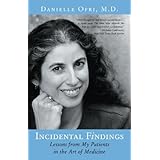
Average Reviews:

(More customer reviews)Dr. Ofri's first book of essays, "Singular Intimacies," was a soul-searching, thought-provoking self-portrait of becoming a doctor at a busy, inner-city hospital, New York's Bellevue. Ofri is still at Bellevue as an attending physician and editor of the Bellevue Literary Review.
This second reflective and graceful book of essays ranges over her experiences since - from far-flung temp positions during a post-qualifying travel break to her own rude awakening as a patient during her first pregnancy. But the bulk of the book revolves around Bellevue; the month-long rotations on hospital wards and the ongoing clinic practice which is her base. In the hospital rotations her interaction with a patient is intense, but finite. She prefers the clinic where the people are less sick, but the relationship is ongoing.
The book opens with Ofri's first experience as a patient dismayed by a busy doctor's delivery of fear-inducing news, the intimidation inherent in the relationship, and the medical professional's casual use of jolting jargon, like "high risk." In one of the last essays, she delivers her baby and discovers the reality of being an ordinary patient:
"I had no idea how much shame and humiliation are part of the experience: from the horrid gowns that never cover enough, to the exposure of some of the most private and embarrassing bodily functions, to the smells and sights which one is forced to wallow in, to the helplessness and inability to assert one's control." Ofri does get to exert control though, when eventually she succumbs to the temptation to throw her weight around - "I am an attending physician on faculty here" - and service improves dramatically.
She describes an ordinary chaotic day in the clinic, capped with anguish when she discovers an elderly Chinese man has a brain tumor and the language barrier prevents her from offering comfort or even information. There's lots of that - the problems of communicating in a place that encompasses so many immigrants. Communications problems do not always stem only from the lack of language interpreters, but also from cultural gulfs.
Ofri is no saint and she's often driven to the edge by frustration - too little time, too many demands, unsympathetic patients. One woman, always accompanied by her young daughter as translator, is a non-compliant, depressed hypochondriac whose arrival fills Ofri with teeth-gritting dread. Until a simple query from the daughter opens her eyes to the real pain that reverberates through the woman's family.
Ofri's treatments often stray outside medical boundaries. She negotiates ways for immigrant children to stay in school rather than accompany non-English speaking parents to the clinic; tutors a boy for the SAT test because her best recommendation for his long-term health was "to take the SAT and get into college."
Issues of poverty, helplessness, dignity and medical ethics dominate. A number of essays deal with terminal issues, two at length. In the first, "Living Will," a man with numerous debilitating health issues stops taking essential medication and lands in the emergency room. Once there, he allows emergency personnel to bypass his living will and ventilate him. This is either a panicky instinct from a man who can't breathe or the spark of a will to live. Like most doctors, Ofri decides the man really wants to live and helps to treat his depression and equip him with a modicum of dignity and usefulness.
The second essay is a bit more invasive. Elderly Mrs. Binet, also with multiple problems, decides to quit dialysis, in effect announcing her will to die. The resident in charge accepts this decision as does Ofri initially, but then she has second thoughts. What terminal illness does the woman have? None. Her life is a misery of pain, pills, procedures and complications, but she is not terminal. Ofri visits the woman and gently but insistently persuades her to postpone death while the doctors work harder on her pain problems. Although the case ends with Mrs. Binet going to the nursing home she so wanted to avoid, Ofri recalls the pleasure she took in eating a meal. Whether she did Mrs. Binet any favors is something with which the reader may quibble.
Ofri is compassionate and painstakingly moral. She is keenly aware of how the structure of her job distances her and insulates her from the poverty, cultural differences, fears and illness of her patients. She takes to heart the lessons they have to teach her, and works to remember that the very fact of illness is a handicap, and the position of being a patient is a disadvantage.
Ofri's intimate, anecdotal prose conveys wonder, humility and pride. For the duration of each essay her struggles are ours and - most of the time - the reader will applaud her judgment. Ofri's books contribute greatly to a dialogue on the doctor-patient relationship that only grows more urgent and difficult as medical treatments advance and doctors grown more specialized.
Portsmouth Herald
Click Here to see more reviews about: Incidental Findings: Lessons from My Patients in the Art of Medicine

No comments:
Post a Comment